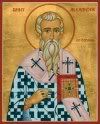And don't forget Blessed Augustine:
…the end of the world will admit us to life everlasting, and then the souls of the just will no longer be subject to the vicissitudes of time.
For the blood of Christ was shed so efficaciously for the remission of all sins, that it could wipe out even the very sin of shedding it.
In the earliest times, "the Holy Ghost fell upon them that believed: and they spake with tongues," which they had not learned, "as the Spirit gave them utterance." These were signs adapted to the time. For there behooved to be that betokening of the Holy Spirit in all tongues, to shew that the Gospel of God was to run through all tongues over the whole earth. That thing was done for a betokening, and it passed away. In the laying on of hands now, that persons may receive the Holy Ghost, do we look that they should speak with tongues? Or when we laid the hand on these infants, did each one of you look to see whether they would speak with tongues, and, when he saw that they did not speak with tongues, was any of you so wrong-minded as to say, These have not received the Holy Ghost; for, had they received, they would speak with tongues as was the case in those times?

